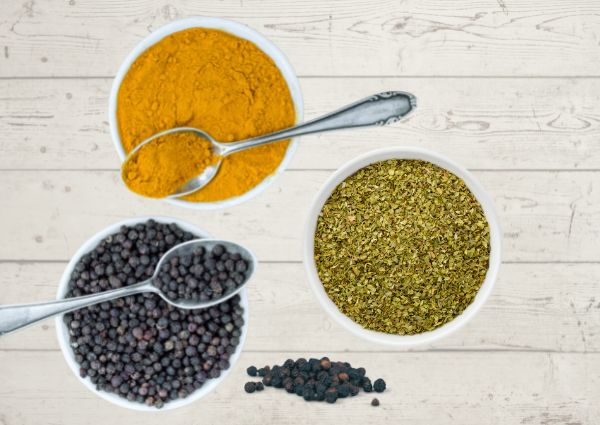3 Commonly used Brain-Boosting Spices
What do you think of when you’re considering which spices to add to your recipe? As you know, spices are tasty and easy to add to multiple dishes you cook at home, but it may come as a surprise to you to find out that some of them can also help your brain to work more effectively.
They have powerful chemicals in them that can enhance your brain function. From memory to strategic thinking, these spices can help!
Boost your brain with these spices:
1. Turmeric is one of the most popular spices around the world. It has a chemical known as curcumin that can help your mental function.
- Turmeric may help you fight depression, strengthen your memory, and have more positive moods. Turmeric may also help fight the plaque that can build up in your brain over time and lead to Alzheimer’s. Researchers are studying this powerful spice so it can be used to help Alzheimer’s patients.
2. Oregano. Oregano has multiple health benefits, and one of them is helping your brain. Oregano is a strong spice, but even a little bit in your cooking can make a difference in your brain.
- This spice has many antioxidants. It’s well-known for fighting free radicals that can damage your cells and tissues.
- In several studies, oregano has shown an ability to help people uplift their moods. It can reduce anxiety and depression. It may also help you concentrate and remember things better.
- The compounds in oregano have a direct impact on neurotransmitters in your body and brain. This is why it’s such a powerful way to strengthen your mental function.
3. Black pepper. You probably have this in your kitchen cupboard already, but you may want to use it more often. Black pepper has a chemical known as piperine, which can boost your brain power.
- The chemicals in this spice can help lighten your mood, strengthen concentration levels, and make you feel more relaxed.
- There’s another benefit to black pepper that researchers are focusing on right now. It’s related to Parkinson’s disease and the possibility of using concentrated black pepper to help people fight the negative brain effects of this condition.
How to Use These Spices
If you’re not used to cooking with turmeric, oregano, or black pepper, it may seem overwhelming. However, you can start off small and increase how much you use over time.
Follow these strategies:
- Invest in fresh, high-quality herbs and spices. You may have these spices in your kitchen, but are they fresh? Spices lose their flavor and potency over time, so purchase new supplies if you’ve had them for a while.
- Add these spices to your current recipes. Can you add one or more of them to your favorite soup or stew without hurting the classic? It’s sometimes easier to integrate spices into current dishes that you already make.
- Discover new recipes. Consider learning to make new dishes that rely on turmeric, oregano, or black pepper for their flavor. This will help you expand your cooking skills and introduce you to new ideas.
Spices are an easy way to help your brain each day. You can add them to your meals throughout the week and watch the benefits increase over time. You may even notice a change right away. Spices are a powerful way to make your body stronger and healthier while making your cooking taste better.
If you are looking to make changes in the life you want but don’t know where to start or how to get there, coaching may be just what you need! We can find a way to help you bridge the gap between what you should do and doing it and doing it consistently. Visit https://longislandmassageandspa.com/healthandwellnesscoachli/ or give me a call at 631-462-4263 for more information.
MEDICAL DISCLAIMER
All information stated is for educational and informational purposes only, to help the client to pursue his/her life goals in a healthy manner. Coaching is NOT a substitute for counseling, psychotherapy, psychoanalysis, mental health care, or substance abuse treatment. Coaching is not to be used in place of any form of diagnosis, treatment, or therapy. The content should not substitute for medical advice from a qualified health care professional, medical or psychological (mental) diagnosis, treatment, and care.
ACCURACY
Although every effort is made to ensure the accuracy of information shared on or through our website, the information may accidentally contain inaccuracies or typographical errors. Every effort has been made to present you with the most accurate, up-to-date information, but because the nature of scientific research is constantly evolving, we cannot be held responsible for the accuracy of the content.

